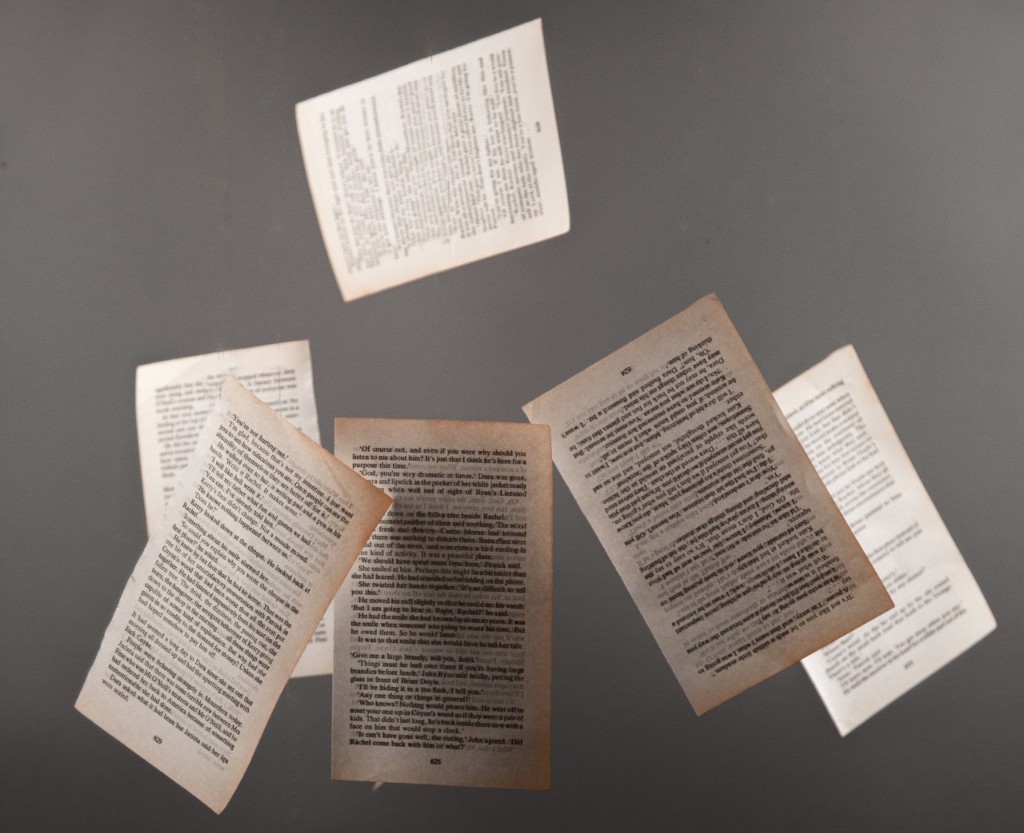okey-panky
“Streaks of White,” by Zoe Venditozzi
“It was almost as if these tiny versions of Dr Hughes actually existed”

“Streaks of White,” by Zoe Venditozzi
She forced it out in a steady stream and stared at the tiled floor. The last thing she wanted was to need the toilet during her appointment. If she moved even slightly in her seat, Dr Hughes seemed to know what she was thinking about. He never said anything, but she knew he knew. It was there in his monstrous eyebrows and his straight mouth. Sometimes she’d sit and look at his eyebrows rather than his eyes and she’d look for so long and so hard that she thought she could see movement. She didn’t imagine insect life in there, but rather several small, very small, minute, versions of the doctor. Once she’d had this thought months ago, right at the start of their appointments, she was unable to unthink it, and now it was almost as if these tiny versions of Dr Hughes actually existed and were watching her and judging her too.
She’s been having dreams about him. This wasn’t unusual apparently. During her second appointment, he’d looked at her with that all-knowing manner of his and said,
“It is likely that over the coming days and weeks you will find yourself thinking and indeed dreaming of me, and of this room.”
She’d nodded, waiting for him to get on with whatever it was he planned to go on about this time. But he waited for her to say something because, as he’d made clear to her at the start of the first session, he was big on verbalising rather than internalising. When he said “verbalising” he leaned forward and squeezed her knee. And then he settled back in his chair and pointed at his stomach when he said “internalising.” She could see the word “internalising” in big, squishy bubble writing sitting inside him like a greedy baby, waiting to be fed emotions that would never be voiced. She realised after what could have been two minutes or twenty — that was one of the reasons she was seeing Dr Hughes, her inability to follow time — that he was waiting for her. She couldn’t think of what he wanted her to say. She’d taken a breath.
“What kind of dreams?” It was a guess, this question, but she’d guessed right.
He struggled to contain a smile.
“All sorts of dreams — you will dream of our appointments. They will start as they actually happened.” He closed his eyes for a long blink. “I may ask you about your feelings concerning your mother, and then let us imagine the door opens and someone you have not seen for a long time comes in angrily. Or the chair you are sitting on may change into a lily pad or a cockroach or perhaps we will suddenly start kissing passionately.” He smiled at her.
Of course the things he suggested all happened in her dream that night. Thankfully, the huge cockroach she was sitting on bucked her off its back, rose on its two hind legs and gobbled the doctor up. She spent the rest of the dream rifling through the filing cabinets while the cockroach leaned back in the doctor’s chair and tried to fold its tiny arms behind its head.
Naturally, the doctor wanted her to talk about her dreams. But what was the point? He was never going to tell her what they meant, he just wrote them down in his pad and nodded occasionally. As far as she could tell, he wasn’t doing anything with the dreams to help her. She suspected he was using her dreams to write screenplays, very detailed ones with narrative arcs and supporting characters. She’d once seen a book entitled You Call the Shots: a Beginner’s Guide to Writing Movies in his bookcase. It was gone the next week. She was becoming increasingly resentful about this theft of her ideas.
If she wasn’t being dropped off and collected by her nervous father every week, she’d have stopped attending weeks ago. But she wouldn’t put it past the doctor to communicate secretly with the bill payer if the patient wasn’t attending. He could tape an X in the office window that would be easily seen as the bill payer’s car pulled up at the kerb. Or there could be an abbreviation in the invoices that would tell tales like “AWOL” or “Abs”. Or maybe he would just pull the blind open as the car pulled up and lift his eyebrows definitively.
In any case, she knew her father was paying a lot to have her treated and the least she could do was go along with it. Her father was less nervous since she’s started her weekly sessions. Though that might have been down to Brenda.
She was glad he’d met Brenda as it took pressure off the dinner planning schedule. On the nights he stayed out, she could eat anything she felt like. Mostly she’d make sandwiches with whatever was in the fridge. Usually what she felt like was eating a cheese sandwich.
This was another area of her life that the doctor was keen to hear about. He wanted every detail of what she’d eaten. Between that and the dreams, she knew she’d be better off just keeping a diary, but clearly it was important to her father that some sort of intermediary, a trained intermediary, interpret her daily happenings. What nobody seemed to understand was that it might be helpful to her to be informed of his interpretations. It had been nearly six months now and so far the doctor had made no report on his findings.
The toilet stall was made of a sludgy-green faux marble. She committed the white-streaked pattern to memory; it would give her some background for when she wanted her mind to switch off in the session. The tiles on the floor were about the size of squares of processed cheese but much paler than the stuff she bought from the discount supermarket.
If she didn’t get going she’d be late. She reached into the dispenser for paper and realised that there was only a couple of squares left. She thought about what the best plan of attack would be here. Scrunching it up wouldn’t make up for the lack of surface area, but it might act as a sponge; folding it up would be better, but then she’d likely get her fingers wet. She didn’t have another option though so she gave herself a small, focussed shake, folded the paper up slightly and did the best she could. That would give her something else to think about to run interference when the doctor was asking questions.
Thankfully there was no one else at the sinks when she came out of the stall. The last thing she wanted was to make chit chat or smile politely. Plus the only other people using this bathroom would either be another client of the doctor or his teeny-tiny partner, Dr Griggs. She sometimes saw Dr Griggs waving clients off and had noticed that she wasn’t one for eye contact. She’d say goodbye looking over the client’s head — no mean feat when you’re a midget. That took some serious looking-over-not-at dedication. Perhaps the doctors decided between the two of them at intake, which patients needed to be looked at, and which needed to be looked over.
She moved along the corridor towards the waiting area, running her fingertips over the textured wallpaper. She couldn’t quite tell what the texture was meant to be — probably something organic, but not somewhere where insects might live — that would be too threatening. One man sat sleeping in the corner, in her seat. She’d have to sit next to the water cooler, which could be noisy, but was at least away from the dull gaze of the receptionist. There were several receptionists who appeared to work on rotation, perhaps on a monthly cycle. Though they were wildly different-looking women, they all had the exact same expressions: one for the doctors (shyly smiling) and one for the non-doctors (I’m better than you and bored). She hated to accidentally catch their eye and didn’t check in any more. She was obviously waiting for her appointment; she knew which door to go through; she knew how things worked. Why should she involve a third person?
She stared at the door. As if on cue, it opened and Dr Hughes filled the doorway. His eyebrows filled his forehead. Light filled the room behind him and she stood as if being pulled by a rope and moved towards the door. He stood aside very slightly so she had to push past him to enter the room. He closed the door.
As he bore down on her, she coloured her mind in with streaks of white on a pine forest green background.








